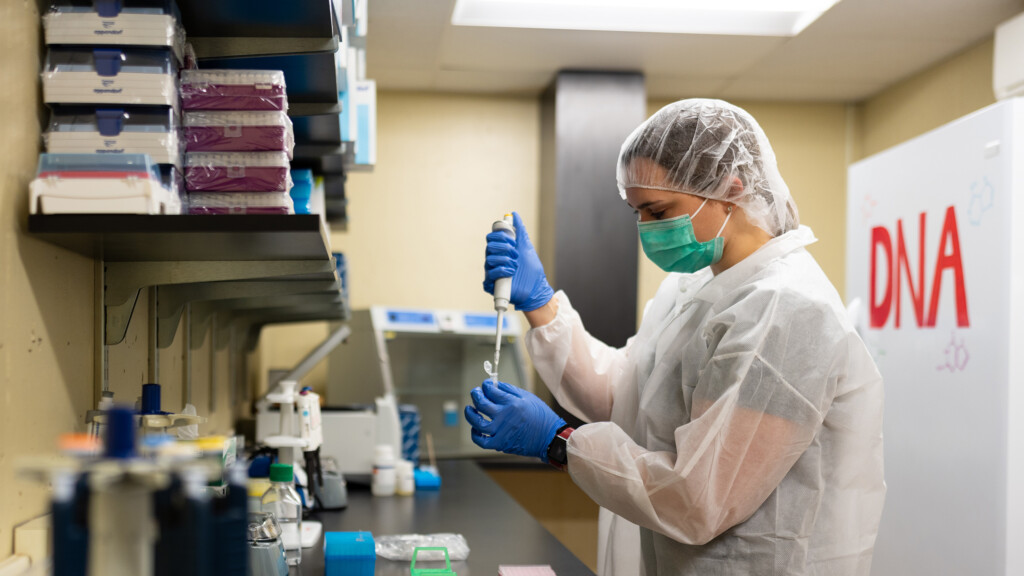
- Degree Level
- Graduate
- Degrees Offered
- Master of Science in Forensic Science
- school/college
- College of Arts and Sciences
Master of Science in Forensic Science
A Master of Science in Forensic Science (MSFS) is a postgraduate degree that focuses on the application of science to the purposes of law. It is a highly interdisciplinary field that has become a vital part of judicial and regulatory systems worldwide. Forensic Science Masters programs prepare you to collect, identify, analyze, and classify physical evidence related to criminal investigations.
Using ever evolving technologies, you learn to perform tests on weapons or substances, such as hair, fibers, and tissue, to determine their significance to criminal investigations. Additionally, you train as specialists in areas like ballistics, fingerprinting, handwriting and/or biochemistry. Professional forensic scientists, law enforcement personnel, and criminal justice employees all recognize the growing need for highly qualified forensic scientists.
The MSFS program at Arcadia University is one of a select few institutions in the country accredited by the Forensic Science Educations Programs Accreditation Commission (FEPAC) of the American Academy of Forensic Sciences (AAFS). Our program provides high quality and professional forensic science and training through research in forensic biology/DNA, chemistry, toxicology and internship in criminalistics, forensic biology/DNA, chemistry, toxicology, medical death investigation and forensic autopsy. Our MSFS offers a variety of courses in forensic biology, chemistry, and toxicology. Arcadia aims to give you a broad theoretical and practical background in the scientific, legal, and investigative aspects of forensic science by and through competent and ethical professional training.
- One of the most renowned FEPAC accredited forensic science graduate programs in the country focused on forensic biology, toxicology, and chemistry;
- Renowned faculty with extensive experience in the classroom and the field;
- State-of-the-art laboratories equipped with the latest instrumentations and a dedicated on-campus crime scene house;
- A 12-week guaranteed internship;
- Two-year graduate scholarships and assistantships available;
- Partnership with the CFSRE and NMS laboratories;
- Our MSFS program was established in 2004, and has over 290 alumni working across the U.S., many of them in forensic biology, chemistry, and toxicology (awarded Best Toxicology Focus by the website, Intelligent.com, which considered 171 universities and colleges for its rankings);
- Renowned American Board of Criminalistics (ABC) and American Board of Forensic Toxicology (ABFT) certified faculty.
Forensic Science Alumni Employment
We are very proud of the success of our alumni, and this is highlighted through the career paths undertaken by our students. Around 80%* of our graduates are working in state, private or government forensic science laboratories. Other students have opted for careers in academia, have gone onto further education, law enforcement, and other related career paths.

*Data based on 88% (n=269) of all alumni
Between 2006 and 2025 there have been 306 student graduates from our Master of Science in Forensic Science program. 248 of our graduates have entered Forensic Science, academia/research, or other scientific fields as a first destination.
Experiential Learning

“The choice of moving across the country for the [Forensic Science Graduate Program] was a [...] rewarding decision. The small class sizes and easy access to experienced faculty have been beneficial to me in achieving a thorough, one-on-one education.”
McKenna Bonn-Savage ’24, MSFS in Forensic Science
*(Public and Private Sector)
** (Non-Forensic)
Featured Courses
Crime Scene Investigation and Reconstruction
Required Course
Gain an in-depth review of crime scene processing and evaluation. Following an overview of documentation and collection of physical evidence from various types of crime scenes without contaminating the scene, students will be taught effective techniques for photographing the crime scene and for the collection of evidence such as latent fingerprints, shoe/tire impressions, trace evidence and biological materials. Students will be given the opportunity to reconstruct an entire crime scene for court presentation.
Criminal Law and Ethics
Required Course
Study introduction to the American criminal justice system. Through discussion and analysis of the U.S. Constitution, the Pennsylvania Constitution, Federal (and State) Rules of Criminal Procedure, and Federal (and State) Rules of Evidence with particular emphasis on case law, students will develop a practical understanding of modern criminal jurisprudence. Special emphasis and consideration will be given to the ethical obligations of criminal justice practitioners, including judges, prosecutors, defense attorneys, law enforcement officers and expert witnesses.
Forensic Chemistry
Required Course
Gain in-depth knowledge of the theories, techniques and vocabulary of the unique field of forensic chemistry. This course covers forensic chemistry techniques and principles relating to controlled substances, ignitable liquids/fire debris and explosives. A review of organic and analytical chemistry as they relate to forensic chemistry will be discussed.
Forensic Biology/DNA
Required Course
Understand a robust background in the theories, techniques, and scientific vocabulary unique to the field of Forensic Serology and DNA Analysis. This course is designed to provide an in-depth view on chemical, physical, immunological, and microscopic methods to the examination and identification of body fluid stains as well as on the whole forensic DNA typing workflow including DNA isolation/extraction, quantification, polymerase chain reaction amplification, capillary electrophoresis and sequencing. Students will acquire a basic understanding of writing expert reports containing serology and DNA results and of expert witness testimony.
Forensic Toxicology
Required Course
Learn about the detection, identification, and quantitation of foreign chemicals (toxins) in the body. In order to accurately interpret toxicological findings it is essential that the toxicologist has an understanding of the pharmacology of that substance and the pathological effects it has on the body. In this context Forensic Toxicology can be divided into two categories, post-mortem toxicology and human performance toxicology. This course will provide the student with the skills for development of a detailed knowledge of the types of toxic substances and matrices encountered in Forensic Toxicology and the procedures by which these are tested in the laboratory. Students will also utilize their theoretical knowledge of pharmacology in the application to Forensic Toxicology casework.



